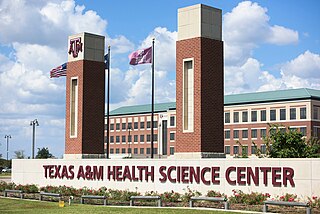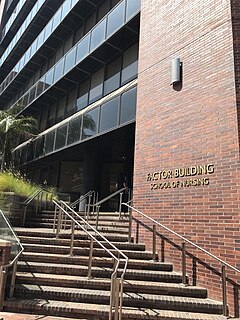
Physical therapy (PT), also known as physiotherapy, is one of the allied health professions. It is provided by physical therapists who promote, maintain, or restore health through physical examination, diagnosis, prognosis, patient education, physical intervention, rehabilitation, disease prevention, and health promotion. Physical therapists are known as physiotherapists in many countries.

A respiratory therapist is a specialized healthcare practitioner trained in critical care and cardio-pulmonary medicine in order to work therapeutically with people suffering from acute critical conditions, cardiac and pulmonary disease. Respiratory therapists graduate from a college or university with a degree in respiratory therapy and have passed a national board certifying examination. The NBRC is the not-for-profit organization responsible for credentialing the seven areas of Respiratory Therapy in the United States.

The Medical University of South Carolina (MUSC) is a public medical school in Charleston, South Carolina. It opened in 1824 as a small private college aimed at training physicians. It is one of the oldest continually operating schools of medicine in the United States and the oldest in the Deep South. The school's main building was designed by Charleston architect Albert W. Todd.
The Bachelor of Science in Nursing also known in some countries as a Bachelor of Nursing (BN) or Bachelor of Science (BS) with a Major in Nursing is an academic degree in the science and principles of nursing, granted by an accredited tertiary education provider. The course of study is typically three or four years. The difference in degree designation may relate to the amount of basic science courses required as part of the degree, with BScN and BSN degree curriculums requiring completion of more courses on math and natural sciences that are more typical of BSc degrees and BN curriculums more focused on nursing theory, nursing process, and teaching versions of general science topics that are adapted to be more specific and relevant to nursing practice. Nursing school students are generally required to take courses in social and behavioral sciences and liberal arts, including nutrition, anatomy, chemistry, mathematics, and English. In addition to those courses, experience in physical and social sciences, communication, leadership, and critical thinking is required for a bachelor's degree. BSN programs typically last 2–4 years. Someone who holds a BSN can work in private or public medical and surgical hospitals, physician's offices, home health care services, and nursing facilities. Having a BSN can result in more opportunities and better salary than just an associate degree.
Nurse education consists of the theoretical and practical training provided to nurses with the purpose to prepare them for their duties as nursing care professionals. This education is provided to student nurses by experienced nurses and other medical professionals who have qualified or experienced for educational tasks, traditionally in Nursing schools. Most countries offer nurse education courses that can be relevant to general nursing or to specialized areas including mental health nursing, pediatric nursing and post-operatory nursing. Courses leading to autonomous registration as a nurse typically last four years. Nurse education also provides post-qualification courses in specialist subjects within nursing.

The Texas Tech University Health Sciences Center (TTUHSC) is a public medical school based in Lubbock, Texas, with additional campuses in Abilene, Amarillo, Dallas, El Paso and the Permian Basin. TTUHSC serves more than 100 counties in the western portion of Texas. The university is a separate institution from Texas Tech University; both universities are among four universities that are part of the Texas Tech University System.

The South Texas Medical Center (STMC) or Bexar Country Hospital District consists of 900 acres (360 ha) of medical-related facilities on the northwest side of San Antonio, Texas, USA.
A mental health professional is a health care practitioner or social and human services provider who offers services for the purpose of improving an individual's mental health or to treat mental disorders. This broad category was developed as a name for community personnel who worked in the new community mental health agencies begun in the 1970s to assist individuals moving from state hospitals, to prevent admissions, and to provide support in homes, jobs, education, and community. These individuals were the forefront brigade to develop the community programs, which today may be referred to by names such as supported housing, psychiatric rehabilitation, supported or transitional employment, sheltered workshops, supported education, daily living skills, affirmative industries, dual diagnosis treatment, individual and family psychoeducation, adult day care, foster care, family services and mental health counseling.

The Texas A&M Health Science Center, a component of Texas A&M University, offers health professions research and education in dentistry, medicine, nursing, biomedical sciences, public health, and pharmacy. It was established in 1999 as an independent institution of the Texas A&M University System and received accreditation in December 2002 from the Southern Association of Colleges and Schools to award baccalaureate, master’s, doctoral and professional degrees. The institution merged with Texas A&M University proper on July 12, 2013.
The University of Virginia School of Nursing, established in 1901, is a school of nursing education. It has an enrollment of approximately 800 students, and is consistently rated in the top 4% of U.S. nursing schools. After the retirement of Dorrie K. Fontaine as the fifth dean of the School, two-term American Nurses Association President Pam Cipriano, a research faculty member at UVA for years, stepped in as interim dean in August 2019.
In the United States, a psychiatric-mental health nurse practitioner (PMHNP) is an advanced practice registered nurse trained to provide a wide range of mental health services to patients and families in a variety of settings. PMHNPs diagnose, conduct therapy, and prescribe medications for patients who have psychiatric disorders, medical organic brain disorders or substance abuse problems. They are licensed to provide emergency psychiatric services, psychosocial and physical assessment of their patients, treatment plans, and manage patient care. They may also serve as consultants or as educators for families and staff. The PMHNP has a focus on psychiatric diagnosis, including the differential diagnosis of medical disorders with psychiatric symptoms, and on medication treatment for psychiatric disorders.

The UCLA School of Nursing is a nursing school affiliated with UCLA, and is located in the Westwood neighborhood of Los Angeles, California. The school is housed in the Doris and Louis Factor Health Sciences Building, known as the Factor Building, on the south end of UCLA's 400-plus-acre campus, adjacent to the Ronald Reagan UCLA Medical Center.

The Nicole Wertheim College of Nursing and Health Sciences (NWCNHS) at Florida International University, located in Miami, Florida in the United States is one of the university's 26 schools and colleges and was founded in 1982. The Dean of the college is Dr. Ora Strickland and the college has more than 3,500 alumni nurses.

The University of South Florida College of Nursing is one of 14 colleges at the University of South Florida. Each year, the college educates more than 2,000 students at three campuses: Tampa, St. Petersburg, and Sarasota-Manatee.
The University of San Francisco School of Nursing and Health Professions (SNAHP) is the nursing school of the private University of San Francisco, located in San Francisco, California. First established in 1954, the school has approximately 1,300 students.

Nursing is a profession within the health care sector focused on the care of individuals, families, and communities so they may attain, maintain, or recover optimal health and quality of life. Nurses may be differentiated from other health care providers by their approach to patient care, training, and scope of practice. Nurses practice in many specialties with differing levels of prescription authority. Nurses comprise the largest component of most healthcare environments; but there is evidence of international shortages of qualified nurses. Many nurses provide care within the ordering scope of physicians, and this traditional role has shaped the public image of nurses as care providers. Nurse practitioners are nurses with a graduate degree in advanced practice nursing. They are however permitted by most jurisdictions to practice independently in a variety of settings. Since the postwar period, nurse education has undergone a process of diversification towards advanced and specialized credentials, and many of the traditional regulations and provider roles are changing.
West Coast University (WCU) is a private, for-profit university focused on healthcare degrees with campus locations in Los Angeles, Anaheim, and Ontario, California; Dallas, Texas; and Miami, Florida. David Pyle founded American Career College in 1979 under the name of American College of Optics. Originally the school focused only on optical dispensing. In May 1997, Pyle purchased West Coast University, which was chartered by the State of California in 1909, out of bankruptcy, and developed a program for the training of registered nurses.
The Jane and Robert Cizik School of Nursing at the University of Texas Health Science Center in Houston (UTHealth) is an American nursing education institution.

The Mercer University Health Sciences Center opened on July 1, 2012. The Health Sciences Center has campuses in Macon, Atlanta, Savannah and Columbus in the U.S. state of Georgia.
Nursing is the largest healthcare profession in the United States, with more than 3.1 million registered nurses. Between 2012 and 2022, employment for nurses is projected to grow by 19 percent, which is more than any other profession. Nurses make up the largest component of staff in hospitals but are also able to provide care in clinic settings, patient's homes, schools, nursing homes, public health agencies, and mental health centers. In addition, nurses can be found in the military, in industry, nursing education, and do health care research. Nurses in these various roles and settings can provide direct patient care and case management, but also develop and establish nursing practice and quality standards within complex healthcare systems. As each degree can provide a different level of care for patients and function in vastly different roles, it is important to differentiate between them. The levels of nursing degrees have different educational requirements, licensure, and credentialing that can vary state to state.











